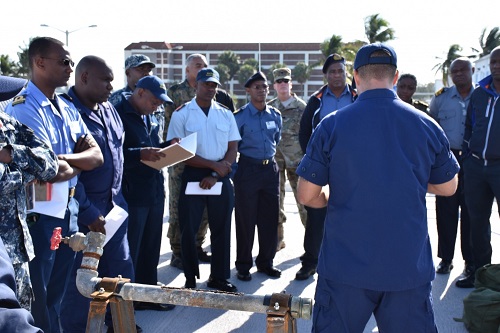USCG photo
By
Ricardo Swire
Rapport between America and Caribbean island states is multidimensional and complex. America is CARICOM‘s most significant economic trading partner. As a strategic geographical location the Caribbean is considered America’s “third border.” The tropical region’s distinctiveness is promoted by the “US Enterprise of the Americas Initiative” and the “Free Trade Agreement of Americas.” Such special association diplomatically demonstrated via the Caribbean Basin Security (CBSI) Initiative.
The CBSI’s priorities are maritime/aerial security cooperation, law enforcement capacity building, border/port security upgrades, firearms interdiction and citizen security improvements. Over time US policy towards the Caribbean was revised. Presidents and administrations changed, foreign policy reviewed. Caribbean intelligence data highlights global terrorism, cyber-crime, money laundering, human and drugs trafficking as the most aggressive CARICOM internal security fears. Security costs are usually regarded by local governmental and corporate entities as an additional, burdensome or unnecessary expense.
Updated statistics calculated crime’s national price tag at four percent of Gross Domestic Product (GDP). Trans-regional criminal flows and associated linkages generate additional violence and threats to Caribbean governance. Despite political attempts at integration the region remains defined by fragmentation. Holistically, the Caribbean is supported by CARICOM and the Organization of East Caribbean States (OECS). Regional crime patterns indicate western Venezuelan drug traffickers’ dominance, of neighboring overland Central American routes, frustrates regional interdiction.
Accurate intelligence concerning cocaine shipments moving from Zulia, San Cristobal, Apure and Colombia’s north coast to Hispaniola is difficult to verify. Venezuela’s deteriorating economy, compounded by law enforcement deficiencies, fuel a rebirth of piracy. Especially near Venezuela’s Caribbean coast. Traffickers are constantly targeted by the US Navy and Coast Guard (USCG) “Operation Martillo.” The severity of Venezuela’s deteriorating internal security promotes illegal trade with T&T six hundred and seventy miles away. Aruba and Curacao are impacted by contraband flows from the Bolivarian Republic’s northwestern coast.
America’s new political policy demonstrates a bilateral issue-focused approach to CARICOM’s fifteen member states along with Cuba, the Dominican Republic and Haiti. The 1990 revised Caribbean Basin Economic Recovery Act (CBERA) and 2000’s Caribbean Basin Trade Partnership Act (CBTPA), which strengthened CBERA, provides unilateral duty-free market access for goods from beneficiary countries. CARICOM members minus Suriname are CBERA beneficiaries. Barbados, Belize, Guyana, Haiti, Jamaica, Saint Lucia and Trinidad & Tobago (T&T) are eligible to receive CBPTA’s enhanced settlements.
The 2006 Haitian Hemispheric Opportunity through Partnership Encouragement Act (HOPE) improved access for select apparel enjoyed by Haiti under CBTPA. The adjoining half of Hispaniola is enhanced by the Dominican Republic-Central America Free Trade Agreement. Regional intelligence analysis indicate the novel US approach is a clear deviation from former President Reagan’s Caribbean Basin Initiative (CBI) and ex-President G.W Bush’s Third Border Initiative (TBI). In December 2016 the White House introduced the US/Caribbean Strategic Engagement Act (HR 4939).
The multiyear strategy signalled more US/Caribbean engagement, especially in CARICOM’s energy and security sectors. Over the past five years some CARICOM states turned to China in pursuit of critically needed infrastructure development aid. America’s rival superpower has financed and constructed several Caribbean highways, hospitals, concert halls, stadiums and government buildings. Caribbean intelligence data suggests that Chinese triads are the dominant human trafficking and smuggling gurus, used by transnational groups that illegally move persons to the USA.
Ricardo Swire
Ricardo Swire is the Principal Consultant at R-L-H Security Consultants & Business Support Services and writes on a number of important issues.



No Comments Yet!
You can be first to comment this post!